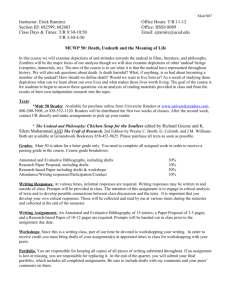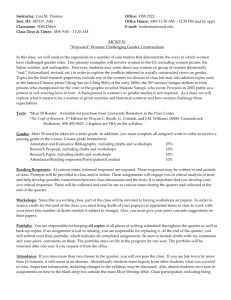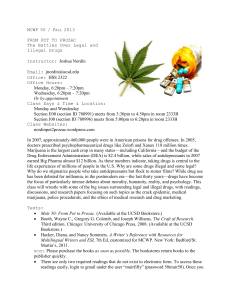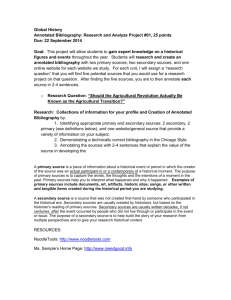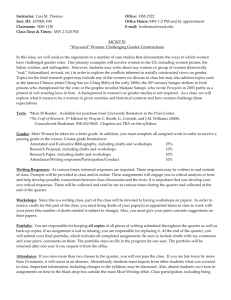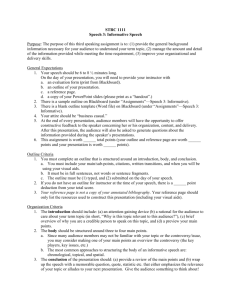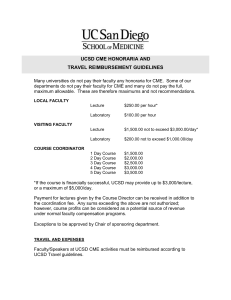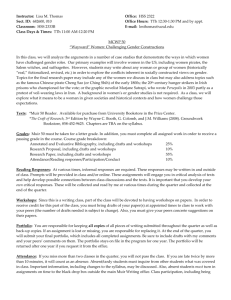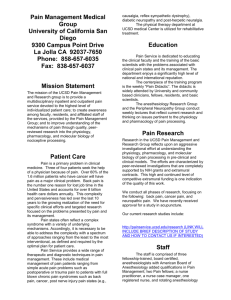MUIR 50: Medicine, Culture, and AIDS
advertisement
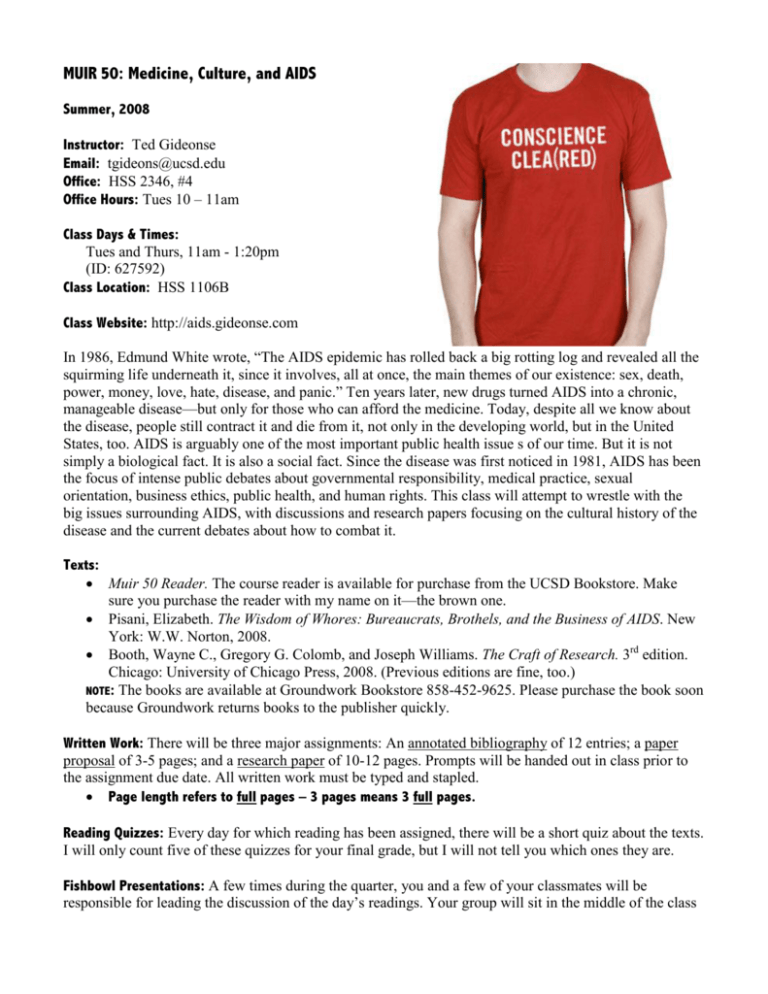
MUIR 50: Medicine, Culture, and AIDS Summer, 2008 Instructor: Ted Gideonse Email: tgideons@ucsd.edu Office: HSS 2346, #4 Office Hours: Tues 10 – 11am Class Days & Times: Tues and Thurs, 11am - 1:20pm (ID: 627592) Class Location: HSS 1106B Class Website: http://aids.gideonse.com In 1986, Edmund White wrote, ―The AIDS epidemic has rolled back a big rotting log and revealed all the squirming life underneath it, since it involves, all at once, the main themes of our existence: sex, death, power, money, love, hate, disease, and panic.‖ Ten years later, new drugs turned AIDS into a chronic, manageable disease—but only for those who can afford the medicine. Today, despite all we know about the disease, people still contract it and die from it, not only in the developing world, but in the United States, too. AIDS is arguably one of the most important public health issue s of our time. But it is not simply a biological fact. It is also a social fact. Since the disease was first noticed in 1981, AIDS has been the focus of intense public debates about governmental responsibility, medical practice, sexual orientation, business ethics, public health, and human rights. This class will attempt to wrestle with the big issues surrounding AIDS, with discussions and research papers focusing on the cultural history of the disease and the current debates about how to combat it. Texts: Muir 50 Reader. The course reader is available for purchase from the UCSD Bookstore. Make sure you purchase the reader with my name on it—the brown one. Pisani, Elizabeth. The Wisdom of Whores: Bureaucrats, Brothels, and the Business of AIDS. New York: W.W. Norton, 2008. Booth, Wayne C., Gregory G. Colomb, and Joseph Williams. The Craft of Research. 3rd edition. Chicago: University of Chicago Press, 2008. (Previous editions are fine, too.) NOTE: The books are available at Groundwork Bookstore 858-452-9625. Please purchase the book soon because Groundwork returns books to the publisher quickly. Written Work: There will be three major assignments: An annotated bibliography of 12 entries; a paper proposal of 3-5 pages; and a research paper of 10-12 pages. Prompts will be handed out in class prior to the assignment due date. All written work must be typed and stapled. Page length refers to full pages – 3 pages means 3 full pages. Reading Quizzes: Every day for which reading has been assigned, there will be a short quiz about the texts. I will only count five of these quizzes for your final grade, but I will not tell you which ones they are. Fishbowl Presentations: A few times during the quarter, you and a few of your classmates will be responsible for leading the discussion of the day’s readings. Your group will sit in the middle of the class Muir 50 / Summer 2008 / 2 and discuss the readings with each other and answer questions from the rest of the class. How you decide to present the readings is up to you. I encourage you to be creative – as creative as possible. Grades: You must take Muir 50 for a letter grade. In addition, you must complete all assigned work in order to receive a passing grade in the course. Course grade breakdown: Paper proposal 10% Annotated bibliography 25% Research paper 55% Participation and reading quizzes: 10% Workshops: Because this is a writing class, part of the class will be devoted to workshopping papers. In order to receive credit for this part of the class, you must bring drafts of your paper(s) at appointed times to class for workshopping with your peers (number of drafts needed to be determined later). Also, you must give your peers concrete suggestions on their papers. Workshop participation is as important as participation during class discussions. Portfolio: You are responsible for keeping all copies of all pieces of writing submitted throughout the quarter as well as back-up copies. If an assignment is lost or missing, you are responsible for replacing it. At the end of the quarter, you will submit your final portfolio, which includes all completed assignments. Be sure to include drafts with my comments and your peers’ comments on them. The portfolio stays on file in the program for one year, but will not be returned unless you request it. Attendance: If you miss more than two classes in one quarter, you will be in danger of failing the class. Missing a conference appointment with me will be counted as an absence. If you are late twice by more than five minutes, I will count it as an absence. Absent and tardy students must ask other students what was covered in class. Important information, including changes to the syllabus, may have been discussed. Also, absent students must turn in assignments on time to the black drop box outside the office. Class participation, including being prepared to discuss the assigned texts, is crucial to this course. If you dare to sleep in class, you will be counted as absent. It is impossible to participate in the class if you are unconscious. If you do not participate in class, you will be counted as absent. Prerequisites: You MUST have fulfilled your Subject A and Muir 40 requirements to be in this class. You will NOT receive credit for this class without first fulfilling the prerequisites. Conduct: Always bring your reader or assigned text to class. Assigned readings are to be completed before class. Please come prepared to discuss the material in a thoughtful manner. Turn off your mobile phones. I will answer your cell phone if it rings, and you’ll be sorry. Do not check your email in class. Do not send anyone an instant message. Do not send anyone a text message. I don’t care if you bring coffee or soda or bottled water to class. I would prefer that you do not eat in class. If you are starving, then a small, quiet snack is okay. A full meal is not. Be respectful to classmates and instructor. Any comments or actions that instigate or contribute to a disrespectful or hostile environment in the classroom will not be tolerated. Any individual who, as a result of their words or behavior, silences their classmates will be held accountable. Muir 50 / Summer 2008 / 3 Paper Submission: The only acceptable way to submit a final paper to me—other than in person—is to place it in the black drop box outside the Muir Writing Program office. (Some paper drafts and assignment may be sent by email.) Do not slide papers under the program door or leave them in my personal mailbox. You will be asked to use a specific documentation and format style according to each assignment; this will be made clear with each assignment. Papers also must be: Typed in Times Roman, 12-point (no larger, no smaller) On 8 ½‖ x 11‖ white paper Double-spaced Stapled A header on every page that includes your name and a page number Turnitin.com: The same final papers you turn in to me must be uploaded to www.turnitin.com. Turnitin.com is an online database that checks your paper for matches with websites, published work, and other student papers. Failure to submit your papers to turnitin.com will result in an F for the course. Late Papers: Late papers are not accepted unless special arrangements are made with me before the due date—NO EXCEPTIONS! Email Account: Sign up for a free UCSD email account immediately. The official form of communication at UCSD is email, and you must use your UCSD email account to communicate with the university, Muir Writing, and me. The Academic Computing office is located in APM 2113; their website is http://acs.ucsd.edu. Check your inbox at least once a day for course announcements. If contacting me by email, please use appropriate email etiquette. Academic Integrity: Students are expected to do their own work as outlined in the UCSD Policy on Academic Integrity published in the UCSD general catalog (http://www.ucsd.edu/catalog/front/ AcadRegu.html). Acts of academic dishonesty will not be tolerated. Any student who engages in suspicious conduct will be confronted and subject to the disciplinary process. Online Course Evaluations: Each Muir Writing Program student is asked to complete an online Course Evaluation. A link to the evaluation, along with instructions for accessing and completing the evaluation, will be emailed to your UCSD email account during Week 8. Print out the Confirmation Page—the final page of the online evaluation—and submit it as part of your final portfolio. Tutoring Appointments: Free tutoring is available to students enrolled in MCWP courses. Obtain a Referral Form from your instructor, then sign up at the main office for a 30-minute appointment. Cancel your appointment in advance if you are unable to attend; there are a limited number of appointments available, and not showing up may prevent another student from getting help. A missed appointment will be counted as an absence by your instructor. If students miss a second appointment, they will lose tutoring privileges. Useful Websites: Muir College Writing Program: http://www-muir.ucsd.edu/muir-writing/index.html Academic Integrity at UCSD: http://www.ucsd.edu/catalog/front/AcadRegu.html MLA documentation style: http://www.dianahacker.com/resdoc/home.html Non-sexist language: http://owl.english.purdue.edu/handouts/general/gl_nonsex.html Turnitin.com: http://www.turnitin.com Muir 50 / Summer 2008 / 4 Schedule (subject to change): Week 1 T 7/1 Introductions, class expectations, the syllabus, and in-class writing. Introduction to the research project and the annotated bibliography. Week 2 Week 3 Week 4 Week 5 Week 6 Th 7/3 Discuss: The Craft of Research, 37-107; library skills and research. Present: Split into three groups, each presenting one of the following: Susan Sontag, Illness as Metaphor and AIDS and Its Metaphors; Abraham Verghese, My Own Country Marita Sturken’s ―AIDS and the Politics of Representation‖; Douglas Crimp, ―Accommodating Magic‖ Alex Shoumatoff, ―The Lazarus Effect‖; Michael Specter, ―The Denialists: The Dangerous Attacks on the Consensus about HIV and AIDS‖ (download from blog) T 7/8 Present & Discuss: Elizabeth Pisani, The Wisdom of Whores, 1-123. Discuss: The Craft of Research, 108-148. Th 7/10 Present & Discuss: Elizabeth Pisani, The Wisdom of Whores, 124-226. Discuss: The Craft of Research, 149-181. F 7/11 Draft 1 of annotated bibliography (4 entries) due by email by midnight. T 7/15 Teleconference with Elizabeth Pisani. Introduction to research paper proposal. Present & Discuss: Elizabeth Pisani, The Wisdom of Whores, 227-end. Th 7/17 Draft 2 of annotated bibliography (8 entries) due in class. Group workshop on bibliography. F 7/18 Draft 1 of paper proposal due (2-3 pages) due by email to me by midnight. T 7/22 CONFERENCES: NO CLASS! Th 7/24 Draft 2 of paper proposal (3-4 pages) due in class. Draft 3 of annotated bibliography (10-12 entries) due in class. Group workshop on proposal and bibliography. F 7/25 FINAL DRAFTS of annotated bibliography (12 entries) and paper proposal due (3-5 pages) by email by midnight. T 7/29 Discuss: The Craft of Research, 183-207 Draft 1 of research paper (6-7 pages) due in class. Group workshop on research paper. Draft 2 (revision of workshopped paper) due by email by midnight. W 7/30 Th 7/31 CONFERENCES: NO CLASS! T 8/5 Draft 3 of research paper (9-10 pages) due in class. Group workshop on research paper. Discuss: The Craft of Research, 208-240. Th 8/7 Draft 4 of research paper (9-10 pages) due in class. Group workshop on research paper. F 8/8 Final Draft of the Research Paper at 3pm, 10-12 pages. Bring your portfolio to be turned in for your final grade. Muir 50 / Summer 2008 / 5
